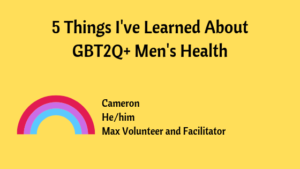
My volunteer placement with MAX Ottawa has come to a close – time flies!
From January 10th to April 26th, I had the pleasure of working with MAX as an event volunteer and workshop facilitator with Totally Outright. Volunteering with MAX has provided an amazing opportunity to learn about the health of GBT2Q+ men, or guys who are into guys, and as an aspiring healthcare practitioner, I’m excited to apply what I’ve learned to my future career.
To reflect on all that I’ve learned throughout my time at MAX, I have compiled a list of key points I’ve taken away about GBT2Q+ men’s health. Here are 5 things I have learned from my placement at MAX:
Many GBT2Q+ men’s health disparities exist.
The GBT2Q+ community has many different health challenges compared to the general population. HIV infection in the community still represents a significant challenge, with guys into guys making up roughly half of the Canadian population living with HIV. Disparities extend beyond HIV infection, with the community being disproportionately at-risk for depression and anxiety, substance use disorders, and colon cancer, among other conditions. These risk factors need to be addressed, and unfortunately barriers in healthcare exist that can prevent them from being addressed fully.
Stigma provides a significant barrier to healthcare.
Based on the Ottawa Gay Men’s Health Survey, ¼ gay or bisexual men are not out to their doctor. Fear of judgement and discrimination, in addition to previous negative experiences within healthcare itself, can make it difficult for patients to disclose their gender or sexual identity, or visit their provider in the first place. For healthcare providers, this means missed opportunities to provide support, screen for risk factors, and provide appropriate treatments and counselling.
Diverse barriers exist to access health services.
Discussions within my workshop highlighted some important access barriers for the community, including cost of transition hormones, difficulty understanding how to access services, and lack of necessary services and providers competent in GBT2Q+ care for guys into guys. Unfortunately, medical schools in Canada provide only 4 hours of training on GBT2Q+ men’s health on average, making it difficult to be competent in GBT2Q+ care without seeking further clinical experience. For transgender individuals finding a competent provider can be particularly difficult, and it has been reported that many transgender individuals must educate their care provider on transgender health to get the care they need.
Different groups have different challenges to access healthcare.
For Indigenous communities on reserves, accessing specialists may require travelling long distances, as GBT2Q+ men may have to leave their communities to access GBT2Q+ resources in urban centers. In addition, language and cultural barriers exist for accessing healthcare. For indigenous guys into guys, historical and current experiences with racism can mean avoiding healthcare altogether. For other racialized people, experiences of discrimination as both as a person of colour and a sexual minority can further discourage guys who are into guys to seek healthcare. There are many more examples of healthcare access issues faced by GBT2Q+ individuals who identify with a minority group which must be acknowledged.
Great work is also being done to break down barriers.
MAX Ottawa, Centertown Community Health Centre, and the AIDs Committee of Ottawa are among the many organizations and community centers doing incredible work to help bridge healthcare gaps experienced by guys into guys in Ottawa. Walk-in mental and sexual health counselling, support groups, and various health-promotion events are among the numerous interventions tailored to the community that are making healthcare more accessible for guys into guys. Research efforts also continue to better outline the health needs of the community, and fundraising is underway to establish a Gay Men’s Research Chair here in Ottawa. While there is much to be done to make healthcare accessible to the community, individuals and organizations have been making great strides towards bridging these gaps in care.
To conclude
We as a community need a healthcare system that will fight for our health. Discrimination puts our community at a heightened risk for a variety of health problems and our current healthcare system is not able to adequately address these issues, in part due to the many barriers guys into guys face when accessing healthcare. Efforts continue, however, to improve quality and access of healthcare to our community and the incredible work from various organizations and individuals in Ottawa cannot be overlooked. As more is learned about the healthcare needs for guys into guys and awareness for GBT2Q+ rights grow, I am hopeful that our community will be able to pursue happier and healthier lives.
As a budding health care provider, I plan to collaborate in the future with different LGBT2Q+ organizations to run a part-time clinic devoted to increasing healthcare delivery for those within the LGBT2Q+ community. Helping to run the medical diversity interest group in my medical school next year, I additionally am planning to use the knowledge and connections gained through this placement to promote more inclusive and culturally sensitive care among my peers.
Cameron
